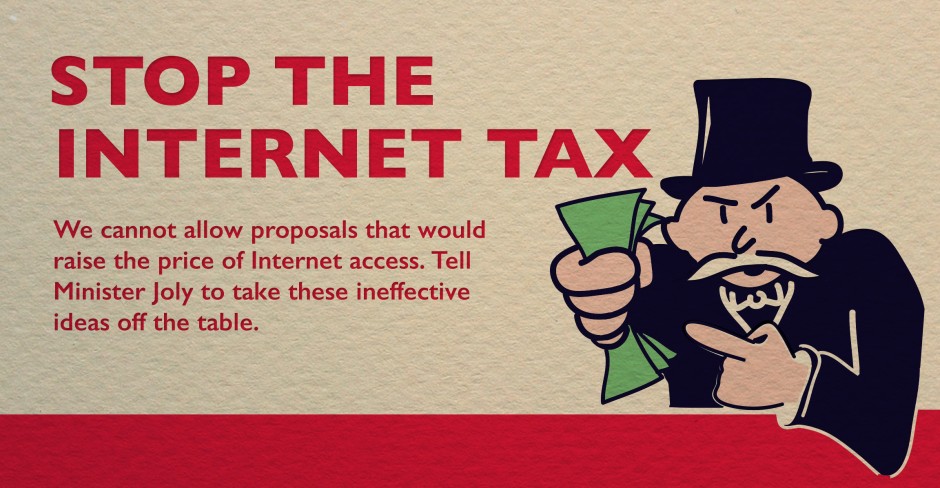Big Win for Canadians as government firmly rules out an Internet Tax!
Thanks to the over 37,000 of you who spoke out to stop the Internet Tax -- it's clear the government has heard your call!
BREAKING: Heritage Minister Mélanie Joly and Prime Minister Justin Trudeau have announced they will reject the House of Commons Heritage Committee's call for an Internet Tax (see below). Minister Joly said she's "committed to lowering taxes for Canadian families and that includes no new taxes for internet distribution," while Prime Minister Trudeau promised "We're not going to be raising taxes on the middle class through an Internet broadband tax. That is not an idea we are taking on."
Thanks to everyone who spoke up via our petition -- it's clear the government have listened! Here's a quick statement I've just issued welcoming the government's move:
"We warmly welcome this morning’s statements from Prime Minister Trudeau and Heritage Minister Joly firmly ruling out an Internet Tax. It’s clear that the government has listened carefully to the over 37,000 Canadians who warned that this proposal would further raise our monthly bills and worsen our digital divide. There was enormous pressure from backroom lobbyists behind this idea, and the government should be commended for resisting this pressure and standing up for Canadian Internet users." - (Meghan Sali, OpenMedia Communications Manager)
Here's what happened earlier:
The House of Commons Heritage Committee released a report promoting the implementation of an Internet Tax — a policy likely to raise the cost of Internet access by five per cent for almost all Canadian Internet users. According to the CRTC, Canadians already pay some of the highest prices in the industrialized world for Internet access — and earlier this month, Bell, Rogers, and Telus again raised the cost of access. Nearly one in five Canadians do not have a home Internet connection, and that number rises to one in three low-income Canadians.
The proposal to apply a five per cent tax on Internet Service Providers (ISPs) appears to be the central plank of the committee’s report — a cost sure to be passed to Internet users. The policy was initially floated during discussions around Heritage Canada’s “Canadian Content in a Digital World” consultation late last year, and was met with huge public outcry. An Innovative Research Group poll from February 2017 shows a full 70 per cent of Canadians are against such a levy.
This proposal is a disastrous idea that will raise monthly bills and force the most vulnerable Canadians offline. Canadians have said in no uncertain terms that they cannot afford for the cost of Internet access to raise any higher. Any Internet Tax disproportionately punishes low-income Canadians, and will inevitably worsen and deepen our digital divide. Many indigenous communities will also be impacted.
In supporting this policy, the Heritage Committee reveals that they’re oblivious to the results of the Heritage Ministry’s consultations on this exact issue. Heritage Minister Mélanie Joly will never take this seriously when her own extensive consultations made it clear that Internet affordability is the top concern for Canadians.
Heritage Canada’s report, published earlier this year, found that while Canadians are open to finding new ways to fund Canadian content, “some participants were concerned that Canadians are increasingly paying for access and that the lion’s share of the traditional household’s 'culture' budget is dedicated to paying for access to the Internet and to the digital platforms that distribute content, leaving little for paying for the content itself.”
The Internet Tax has sparked fierce criticism from experts and Indigenous advocates, who warn that the cost will be passed onto Internet users. Denise Williams, head of the First Nations Technology Council warns the Internet Tax “will hit Indigenous communities the hardest”, and expert Michael Geist says it will place “connectivity beyond the financial reach of low-income Canadians.”
Over 37,000 Canadians have signed on to an OpenMedia petition opposing the Internet Tax.


 Take action now!
Take action now!
 Sign up to be in the loop
Sign up to be in the loop
 Donate to support our work
Donate to support our work